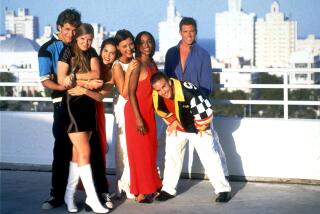‘The Real World: Washington, D.C.’
- Share via
The third edition of MTV’s “The Real World” to premiere in 2009 begins tonight. It is set in Washington, D.C., a city not yet featured in any of the show’s 23 seasons (over an astonishing 18 years), in spite of its only being the capital of the whole entire United States of America. But this is a show that goes where the buzz is, and Bill Clinton’s saxophone notwithstanding, the current president, who was 20 when MTV went on the air and the first chief executive to have conceivably watched it for fun, is a new kind of cool.
For a short while back in the early ‘90s, applying to be on “The Real World” would have been a strange and brave thing to do, but it has long since become a standard travel option/ career path for young adults -- like a Fulbright without the bother of having to know anything. Its conventions are so well established that, as the D.C. housemates arrive at the usual fantastical digs -- this time an 1891 brownstone mansion with its guts ripped out and replaced with what is essentially a patriotically themed pinball machine -- one says, “I’m waiting for the black guy to come in, the really hot black guy with the big muscles,” and another laments, “I thought for sure we’d have a gay guy in the house.” The black guy with the big muscles arrives immediately after, and Christian jock Mike eventually reveals himself as bisexual (as does cult-raised “adrenaline junkie” Emily). So all is in order.
The two preceding series -- “The Real World: Brooklyn” and “The Real World: Cancun” -- represented the yin and yang of this franchise; the former trumpeted as a return to its early years, when it was not just about getting hammered and hooking up, the second pretty much just about getting hammered and hooking up. The current edition seems to want to split the difference.
It is set in an ostensibly serious city at a watershed moment, but even though “I love Barack Obama” are practically the first words spoken here, the opening hour is still largely given over to working out who likes whom and marveling at how hot everyone is. Even young weird Andrew, a “politically incorrect” cartoonist who sleeps with a stuffed polar bear and is possibly still a virgin, is cute enough to play the young weird guy in a movie about hot kids living together in a big house. This world is arguably real for the people living in it, but the series feeds the fantasies of its audience.
Given the setting, it might have been interesting to pick a few housemates whose ambitions dovetailed with the setting -- kids who’d regard a career in the State Department as kind of sexy. Ashley, a 2008 Obama delegate who sees Washington as “the mecca” and “the mother ship,” seems to be shouldering that role alone. (Conservative vegan Callie wants to be a photographer, Josh and Erika are working on pop stardom.) Indeed, in the first hour, politics barely come up; the heavy arguments (at a Buca di Beppo) are all about religion.
As arrogant as some of these whippersnappers can sound, from series to series, most eventually prove vulnerable, their self-satisfied bluster a symptom of their naivete (or perhaps I am just thinking of myself at that age). In any event, they are sweet to one another more often than they are sour, and even through the alcoholic blur and the getting-busy an odd sort of wholesomeness maintains -- certainly compared with MTV’s other reality shows. I find “The Real World” touching almost as often as I find it irritating.
Love it or hate it, as the original Stressful Dormitory show, it is the foundation upon which much subsequent reality television has been based, including “Big Brother” and “Project Runway.” (You can love it or hate it for that too.) The difference here being that (almost) nobody is sent home: The point is not who survives, but how.
Broadly speaking, it’s a kind of group bildungsroman that creates a narrative of encounter, friction and acceptance, in which the cast members “stop being polite and start getting real” and by the end are hopefully changed a little bit for the better. Perhaps they will even learn that being polite and getting real are not mutually exclusive.
More to Read
The complete guide to home viewing
Get Screen Gab for everything about the TV shows and streaming movies everyone’s talking about.
You may occasionally receive promotional content from the Los Angeles Times.







